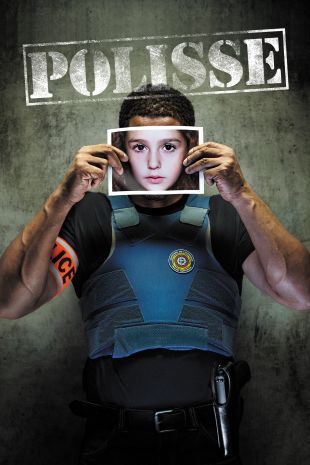_CR.jpg)
Actress-turned-director Maïwenn's contemporary drama Polisse builds a tapestry of intertwined narrative strands from events impacting the Child Protection Unit of the Paris Police Force -- versions of which (we are told at the outset) actually transpired in real life. Maïwenn establishes and follows 8-10 characters -- officers who systematically investigate crimes including child molestation, rape, child pornography, and like social ills, while juggling personal issues such as marital breakups, infidelity, and heartfelt concern for their own children.
Taken on a per-sequence basis, the picture works beautifully. Appropriately enough for the subject, a number of scenes deliver an emotional impact so jarring that we're left reeling with shock, disgust, and incredulity in equal measure. For example, Maïwenn achieves excellence in a mesmerizing substory where a female officer glimpses a woman violently shaking her baby, then brings her in -- only to hear this depraved mother's nonchalant, remorseless description of how she induces her child to sleep. And many of the officers' personal sagas come off engrossingly, particularly one involving Fred (Joey Starr), an agent of North African origin who falls for a photographer assigned to the unit (Maïwenn) and gets slowly drawn away from what appears to be a happy marriage.
_CR.jpg)
When one looks at the movie as a whole, however, it grows more problematic. Maïwenn's chief influence in this picture seems to be Robert Altman -- and like Altman, she wants to push conventional drama beyond the boundaries of traditional narrative structure, into the realm of pseudo-documentary. So some threads get followed, others get dropped after a while, and still others only turn up for a minute or two. And on top of this, Maïwenn never really sustains themes, but instead keeps flecking them onto the screen, right and left, as if she's decorating a graffiti-covered wall of paint. For instance, at the outset she sets up a discussion between an officer and a little girl, who claims that her daddy "scratched [her] on the bottom." As the agent questions the child further, the exact nature of what happened grows less and less obvious in our minds. It's an enthralling conversation, but our natural assumption that this theme of ambiguity will recur throughout the movie is false. In fact, many of the criminals who are subsequently brought in (such as the vile mother) confess so definitively and so shockingly that Maïwenn appears to have suddenly lurched to the other end of the thematic spectrum.
Polisse's looseness may give it a unique aura, but it is also the film's Achilles' heel: the casually-strung thematic quality and the rambling Altmanesque story compound each other's weaknesses. The film could do with either, but if there is a way to pull off both, Maïwenn doesn't quite find it here. On a surface level, the picture that Polisse recalls most is Sidney Lumet's masterful Prince of the City, which is also about detectives and also has the same sort of ambling quality, but for all of its narrative experimentation, that film feels thematically cohesive -- this one is all over the map. We keep waiting for some satisfying apotheosis that never really arrives. Admittedly, Maïwenn must have recognized the need for this, for in a final scene, she feebly attempts to summarize the role of the officers who have taken center stage by cross-cutting between a station meeting and a molestation victim. But the metaphor inherent here is too heavy-handed and precious to really work.
_CR.jpg)
Still, despite Polisse's undeniable flaws, the film does unveil the full breadth of Maïwenn's dramatic ability within individual scenes, and the height of her ambition per se -- both of which are staggering. One walks away longing to know more about all of the characters -- even the incidental ones -- and wishing that some enterprising French producer would option the material for a multi-season television series. In other words, we care deeply, even though we aren't fully satisfied by the scope of what we've seen.
